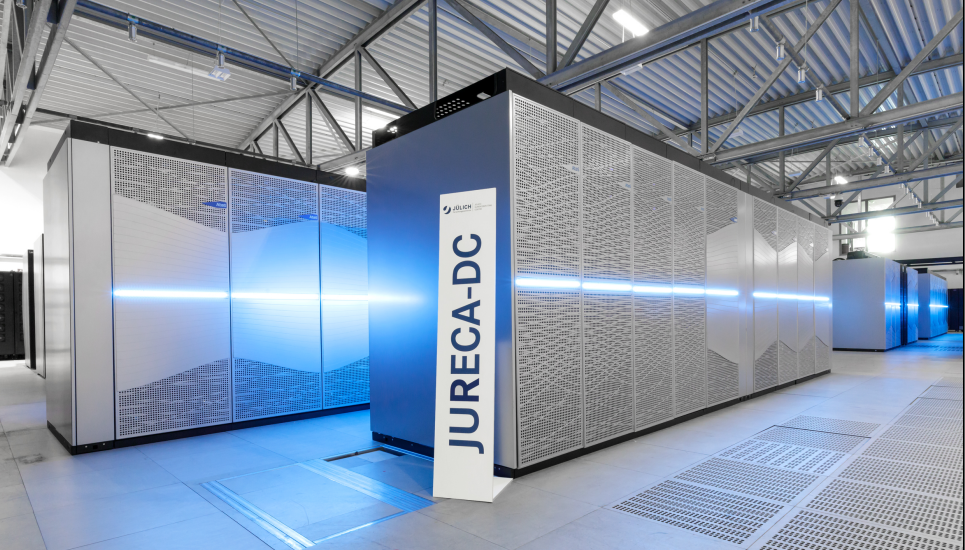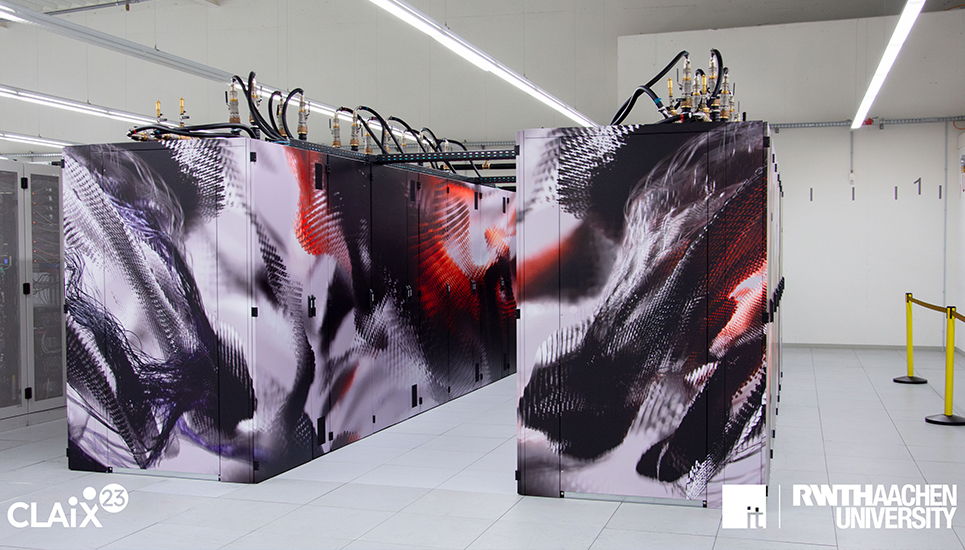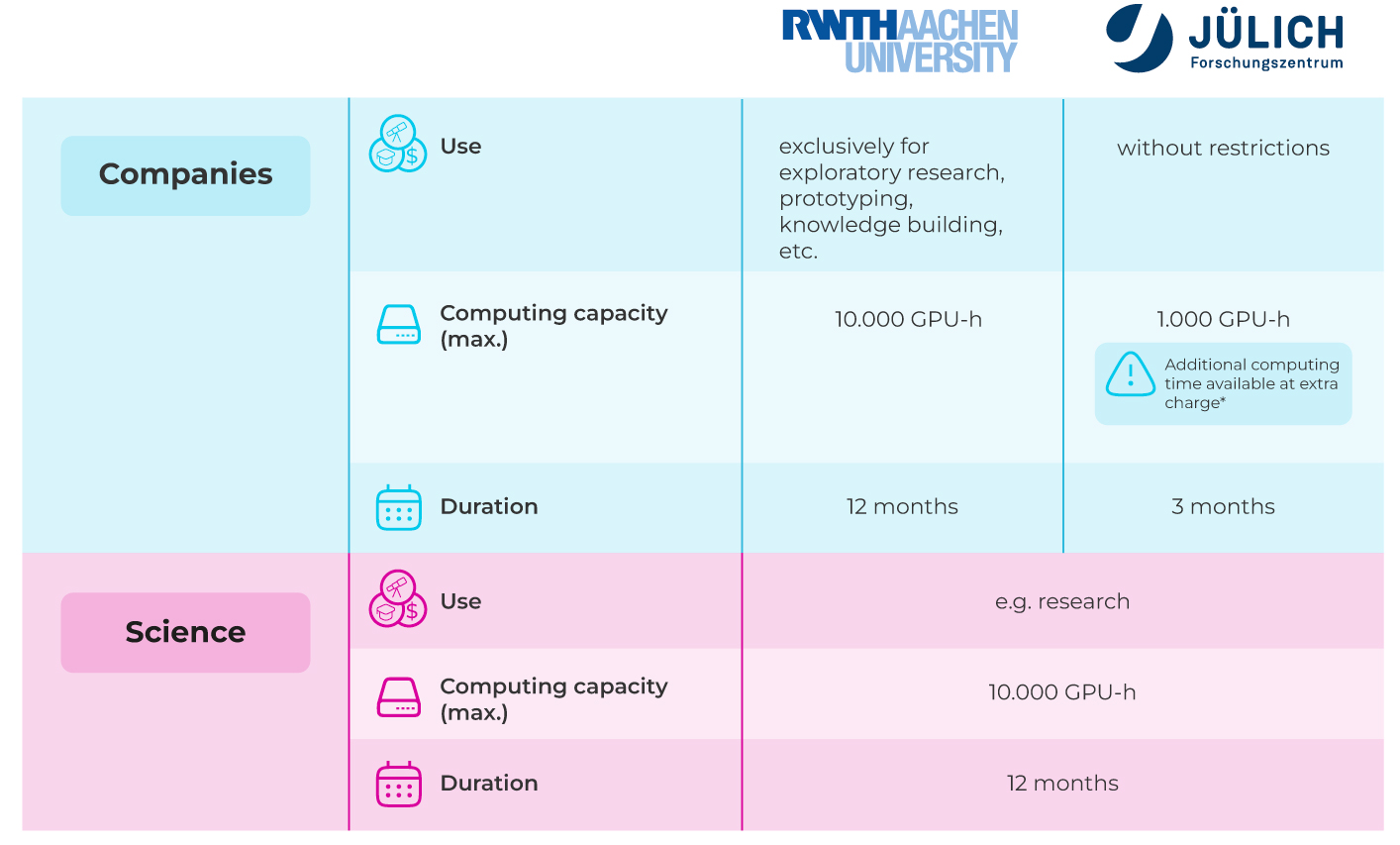
AI-Hardware
Training large AI models requires strong computing power. With WestAI, you can access the specialized High Performance Computing (HPC) computing infrastructure of RWTH Aachen University and Forschungszentrum Jülich. Depending on requirements and use case — be it an explorative research project or commercial use in the company — various computing time quotas are available.
Use our AI infrastructure for your AI idea!
How to make use of our AI computing resources
Are you pursuing an exciting AI project but lack the necessary hardware? Regardless of whether you come from science, a small or medium-sized company or a start-up — book computing time on WestAI’s High Performance Computing (HPC) infrastructure now. Simply complete the application using our five steps and get started!
Depending on the application scenario, provider, and origin of the application — academic or commercial — different conditions and computing time quotas apply when applying for computing time. You can find an overview of these in the table below.
Do you have questions about the application process? We will be happy to support you personally and advise you beyond that. Please contact us.
Companies
Use our computing power for prototyping, experimental developments or production-related applications — depending on the application, between 1,000 and 10,000 GPU-h are available.
Research Institutions
From language models to astrophysics, the potential of AI in science is huge. Our specialized GPU offering supports your research at the highest level — with up to 10,000 GPU-h.
Note: We can currently offer you these services free of charge. We reserve the right to reduce the number of computing time projects if there is a high demand for the systems.
Your partner in High Performance Computing
With decades of experience, the IT Center of RWTH Aachen University and the Jülich Supercomputing Centre at Forschungszentrum Jülich (FZJ) are your experts for High Performance Computing (HPC) at WestAI. We not only guarantee stable operation of our computing clusters, but also ensure continuous updates of the software stack and progressive modernization of the infrastructure. Thanks to our established processes for handling support requests, we can respond quickly to your needs. With us as your partner, you leave the demanding responsibility for HPC infrastructure to proven IT professionals so that research and development can take center stage.
WestAI and its partners, RWTH and FZJ, have created easy access for you to specialized computing infrastructure for training large AI models.

© Forschungszentrum Jülich / Sascha Kreklau

© RWTH Aachen / IT Center
Our AI hardware in detail
To enable the training of large AI models, WestAI offers specialized HPC computing infrastructure. We have a total of 31 servers, each equipped with four NVIDIA H100 GPUs. The exact specifications can be found by clicking on the modules below.
JURECA / Forschungszentrum Jülich
16 computing nodes each with
- 2x Intel Xeon Platinum 8462Y (Sapphire Rapids) CPUs
- A total of 64 cores per node @2.8 GHz (Base Freq.)
- 512 GB DDR5 RAM per node
- 4x NVIDIA H100 GPUs (incl. NVLink Interconnect)
- 94 GB HBM2e per GPU
CLAIX-2023 / RWTH Aachen University
15 computing nodes each with
- 2x Intel Xeon Platinum 8468 (Sapphire Rapids) CPUs
- Total of 96 cores per node @2.1 GHz (Base Freq.)
- 512 GB DDR5 RAM per node
- 4x NVIDIA H100 GPUs (incl. NVLink Interconnect)
- 94 GB HBM2e per GPU
Both systems have an InfiniBand high-performance network that connects the individual computing nodes with each other.
We complement the hardware with an extensive software stack. This includes all common machine learning frameworks such as Scikit-Learn, PyTorch and TensorFlow. It is also possible to bring your own Apptainer container and use it on the system. This allows our users to start their research quickly and without much preparation time.
As with all large HPC systems, we use Linux on our computing clusters. Users usually interact with it via the console. For inexperienced users, the lack of a graphical user interface can be a major barrier to entry. We therefore also offer JupyterHub instances. This allows Jupyter Notebooks to be run directly on the computing cluster via the browser. This user-friendly environment makes it possible to test the system and develop applications efficiently. If you need support with this process, we will be happy to help you in this phase too.
Requirements and general conditions for computing time applications
Applications for computing time can be submitted directly to our HPC providers. If you have any questions or would like us to support you personally with your application, please contact us directly.
Applying to RWTH or Jülich? How to find the right HPC provider
Depending on which environment you come from (science or industry) and which goal you are pursuing with the use of our AI computing resources (e.g. prototyping or commercial use), different computing time quotas are available to you via WestAI at our partners in Aachen and Jülich. The following overview will help you to assess and choose the right location.
Formal requirements
Each application must name a Principle Investigator (PI) and a Person of Contact (PC) with e-mail addresses who will act as the main scientific and technical contact persons for the project. Applications from the corporate context for RWTH Aachen University will be pre-filled with the scientific contact person.
More information on the requirements for computing time applications can be found by clicking on the following module.
More information
Important for academic applications: The following authorized users may apply for computing time projects at WestAI as Principal Investigator:
- Leading scientists (usually with a doctorate) who belong to a state or state-recognized, institutionally accredited university in Germany (including universities of applied sciences).
- Senior scientists (usually with a doctorate) who belong to a public or state-recognized research institution in Germany.
The following requirements must also be met or the following information provided for a computing time application:
- A title (250 characters) and a project description (500 to 2000 characters – approx. one page). This description should have a scientific and project-oriented character. The AI reference and GPU requirements of your project should be evident from the description.
- A technical description of the project (300 to 1000 characters – approx. half a page), e.g. which codes, frameworks, data sets or models will be trained and used.
- (Only for applications for RWTH) An indication of the research focus. This is done according to DFG guidelines, but can be conveniently selected from main and sub-categories via drop-down lists.
Note: The online form for computing time applications is in English and can also be filled out in German if necessary.
Since our offer is specifically designed for GPU resources and AI, please request computing time from the following alternative providers in other cases:
- If you prefer to use CPU resources:
- If you need computing time for Bachelor’s or Master’s theses: Please request Tier 3 resources from your local university HPC provider. You can find more information at e.g:
Five steps to your computing time
The following instructions will show you step by step how to submit your computing time application. If you do not know your exact requirements or need support, we will be happy to advise you.

Step 1: Context and choice of location
Note: The form is in English, but can also be completed in German.
Visit our online form for WestAI computing time applications via the “Joint Application, Review, and Dispatch Service” (JARDS) at the following link.
First, indicate which context you are coming from (Academic or Industry).
Then select the location (RWTH Aachen University or Forschungszentrum Jülich) where you want to apply for computing time. In order to make a well-founded decision, you should consider the respective special features of the two systems, as described below or shown in the table.
CLAIX-2023 of RWTH Aachen University
- Use: Research or explorative industrial projects (no direct commercial use)
- Scope: maximum 10,000 GPU hours
- Duration: 12 months
- Shared use of computing nodes is permitted so that jobs that only require 1 GPU can also be executed, for example.
- The 15 GPU computing nodes that were purchased for WestAI are embedded in a larger partition consisting of a total of 52 systems.
JURECA of the Jülich Supercomputing Center (JSC)
- Use: Research and industrial projects Research and industry projects (without restrictions)
- Scope: maximum 1000 GPU hours (industry) to maximum 10,0000 GPU hours (research)
- Duration: 3 months (industry) and 12 months (research)
- There is currently no provision for shared use of nodes. Applicants should therefore be able to utilize at least one entire node with 4x NVIDIA H100 GPUs.
- Computing time projects at the JSC have higher file quotas (data volume and number of files). If you need to process or store larger data sets or a large number of files in your project, the JSC is the right choice.
Step 2: Login / Registration
The login procedure is either via RegApp (if you already have an HPC account at RWTH Aachen University) or via e-mail verification.
Step 3: Application
Fill out the computing time application. Please note the requirements described above and the information to be provided.
The form is in English, but can also be completed in German.
Note: For applications for the RWTH from the corporate context, the main scientific contact person (PI) is provided and pre-filled by default.
Please also note that the scope of computing time projects within WestAI is limited to 1000 to 10,000 GPU hours, depending on the area of application and intended use.
We reserve the right to reduce the number of computing time projects if there is a high demand for the systems.
Step 4: Finalization
Finalization of the application. This can be done on the last page of the application. After finalization, a summary of the application will be sent by e-mail to the specified contact person PI (research) or PC (applications from industry), who must sign the document. The signed application may then need to be uploaded to the JARDS website.
Step 5: Review and Assessment
Done! Your computing time application will now be reviewed by us. After the assessment, you will be informed about the approval decision and the next steps.
We look forward to helping you realize your AI idea with our computing power!
Get in touch with us!
Do you have any questions or are you interested in working with us?
Feel free to email us, and we’ll be happy to help and advise you.
Follow us on LinkedIn
Don’t want to miss WestAI updates, news, and events or want to share them faster with your network?
Follow us on LinkedIn!
